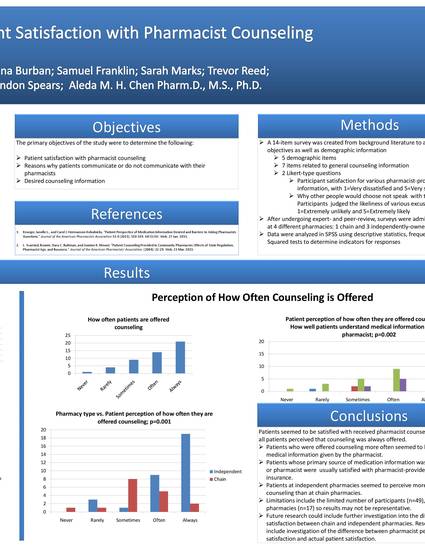
Presentation
Patient Satisfaction with Pharmacist Counseling
The Research and Scholarship Symposium (2013-2019)
Type of Submission
Poster
Campus Venue
Dixon Ministry Center, Alumni Hall
Location
Cedarville, OH
Start Date
4-10-2013 1:00 PM
End Date
4-10-2013 5:00 PM
Creative Commons License
Creative Commons Attribution-Noncommercial-No Derivative Works 3.0
Citation Information
Kristina Burban, Samuel Franklin, Sarah Marks, Trevor Reed, et al.. "Patient Satisfaction with Pharmacist Counseling" (2013) Available at: http://works.bepress.com/aledamhchen/2/

Background: Since the implementation of the Omnibus Budget Reconciliation Act in 1990, pharmacies are required to offer counseling to patients. State laws vary with respect to counseling; patients who live in states that set more stringent laws regarding counseling are better informed about their medications. Patients who receive counseling also are more likely to take their medicine properly and consistently, but as many as 25 percent of patients never speak with their pharmacist. Objective: The objectives of this study were to examine whether patients are satisfied with pharmacist counseling, reasons for dissatisfaction, reasons why patients talk to their pharmacists, and desired counseling information. Methods: A survey was created from the literature. After undergoing expert- and peer-review, surveys were administered to patients at one chain and three independent pharmacies. Data were analyzed using descriptive statistics (frequencies) as well as Chi-Square tests to determine differences. Results: A total of 49 patients completed the surveys (67.3 percent female, mean age=49.5±16.5 years). There was a significant difference in perception of pharmacist busyness between chains and independent (p=0.008), with more patients at chains viewing pharmacists as too busy to counsel. Patients of chains were more likely to perceive that they were not offered counseling by the pharmacist (p=0.001). Patients who were currently receiving medication refills felt that they could trust their pharmacist as much a physician (p=0.006). Patients who received counseling most of the time or all of the time were satisfied with the counseling they received (p=0.003) and were able to easily understand the information they received (p=0.002). Conclusion: Patients seemed to be satisfied with pharmacist counseling when they received it. Patients of independent pharmacies seemed to find the pharmacist more approachable than chain pharmacies, which could explain why they received counseling more frequently.